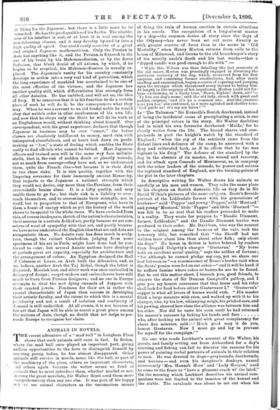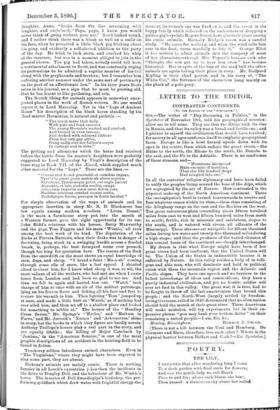ANIMALS IN NOVELS.
THE recent adventure of a " mad bull" in Langham Place shows that such animals still exist in fact. In fiction, where the mad bull once played an important part, giving endless opportunities to the hero to distinguish himself by rescuing young ladies, he has almost disappeared. Other animals still survive in novels, some, like the bull, as part of the machinery of the piece, others as important characters, .nd others again because the writer seems so fond of animals that he must introduce them, whether needed or not. 'Among the great novelists, Sir Walter Scott used them more sumprehensively than any one else. It was part of his happy nit to use animal characters as the unconscious means
of firing the train of human emotion in certain situations in his novels. The recognition of a long-absent master by a dog—the common device of story since the days of the Odyssey—has never been set out more directly or with greater reserve of force than in the scene in Old Mortality," when Henry Morton returns from exile to the house of Milnwood, and listens to the old housekeeper's story of his miserly uncle's death and his last words,—that a "dipped candle was good enough to die with " :-
" While Mrs. Wilson was thus detailing the last moments of the old miser, Morton was pressingly engaged in diverting the assiduous curiosity of the dog, which, recovered from his first surprise, and combining former recollections, had, after much snuffing and examination, begun a course of capering and jumping upon the stranger which threatened every instant to betray him. At length in the urgency of his impatience, Morton could not for- bear exclaiming, in a hasty tone, Down, Elphin ! down, sir ! '— ' Ye ken our dog's name,' said the old lady, struck with great and sudden surprise, and it's no a common one. And the creature kens you too,' she continued, in a more agitated and shriller tone. God guide us ! it's my sin bairn ! '" In The Talisman " Sir Kenneth's Scotch deerhound, instead of being the incidental cause of precipitating a crisis, is one
of the principal actors in the story. Sir Walter doubtless had in mind his own favourite deerhound ' Maida,' for be clearly writes from the life. The hound shares and com- prehends in part the knight's watch by the standard of England; "when the cry of the sentinels came from the distant lines and defences of the camp, he answered with a deep and reiterated bark, as if to affirm that he too was vigilant in his duty." The defence of the standard by the dog in the absence of its master, its wound and recovery, and its attack upon Conrade of Montserrat, as, in company with the other leaders of the crusade, he passes and salutes the replaced standard of England, are the turning-points of the plot in the later chapters.
In descriptive writing Sir Walter draws his animals as
carefully as his men and women. They take the same place in his chapters on Scotch domestic life as they do in Sir David Wilkie's pictures of the same subjects. Scott's fireside portrait of the Liddesdale farmer with his generations of terriers—" auld Pepper' and young Pepper,' auld Mustard' and young Mustard,' little Pepper' and little 'Mustard"—
was felt to be so real that his readers proceeded to make it a reality. They wrote for puppies to "Dandie Dinmont, farmer, Liddesdale," and the Dandie Dinmont terrier was produced to their order. Mr. Davidson, who was the nearest to the original among the farmers of the vale, took the honorary title, but remarked that " the Sheriff had not written mair about him than about other folk ; only about his dogs." No horse in fiction is better beloved by readers than Dogald Dalgetty's charger Gustavus.' "My horse hath an excellent social quality," says the soldier of fortune ; "for although he cannot pledge my cup, yet we share our loaf between us "—a reminiscence of Bruce's border raid when the Scots' ponies were fed on oat cakes—" and it will be hard if he suffers famine where cakes or bannocks are to be found.
Bat to cut this matter short, I beseech you, good friends, to observe the state of Sir Duncan Campbell's palfrey, and I give you my honest assurance that that horse and his rider shall lack for food before either G ustavusor L" 'Gustavus's ' supper is what all lovers of horses would wish. " His master filled a large measure with corn, and walked up with it to his charger, who, by his low, whinnying neigh, his pricked ears, and his pawing, showed how close the alliance was between him and his rider. Nor did he taste his corn until he had returned his master's caresses by licking his hands and face who, after looking on the animal with great complacency for about five minutes, said Much good may it do you, honest Gustavus. Now I must go and lay in provant for myself for the campaign.' " No one who reads Lockhart's account of Sir Walter, his guests, and family setting out from Abbotsford for a day's coursing and fishing can fail to discover the reasons for his power of painting verbal portraits of animals in their relation to man. He was devoted to dogs—greyhounds, deerhounds, and terriers—and even his daughter's donkeys, named irreverently Mrs. Hannah More' and 'Lady Morgan,' used to come to the fence to " have a pleasant crack wi' the laird."
On the morning which Lockhart describes his animal com- panions were not limited to the inmates of the kennel and the stable. The cavalcade was about to set out when his daughter, Anne, "broke from the line screaming with
laughter, and exclaimed, Papa, papa, I knew you would sever think of going without your pet.' Scott looked round, and I rather think there was a blush as well as a smile on his face, when he perceived a little black pig frisking about
his pony, and evidently a self-elected addition to the party
_a the day. He tried to look stern, and cracked his whip at the creature; but was in a moment obliged to join in the general cheers. The pig had taken, nobody coald tell how, a sentimental attachment to Scott, and was constantly urging its pretensions to be admitted a regular member of his tail along with the greyhounds and terriers; but I remember him
suffering another summer under the same sort of pertinacity on the part of an affectionate hen." In his later years Scott -notes in his journal, as a sign that he must be growing old, that he has learnt to like gardening, and cats.
The Scotch liking for animals appears in somewhat tine:- ,pected places in the work of Scotch writers. No one would expect it in Lord Macaulay. Yet in the " Lays of Ancient Some" his description of the black horse standing by his .dead master Herminins, is natural and pathetic :-
" The raven mane that daily
With pats and fond caresses The young Herminia washed and combed, And twined in even tresses, And decked with coloured ribbons From her own gay attire, Hung sadly o'er her father's corpse In carnage and in mire."
The petting and attentions which the horse had received
before the battle from its master's daughters were probably -suggested to Lord Macaulay by Virgil's description of the tame stag in Book VII. of the /Eneid, which supplied much other material for the "Lays." These are the lines :-
" Cervus erat forme; prustanti et cornibus ingens, Tyrrbidm pueri quern matris ab ubere raptum Nutribant, Tyrrheusque pater, cui regia parent Armenta, et late custodia credita campi. Adsuetum imperiis soror omni Silvia cura 11Iollibus iutexens ornabat comm. sertis, Pectebatque ferum, puroque in fonts lavabat."
For simple observation of the ways of animals and its appropriate insertion in story Mr. R. D. Blackmore has dew equals among modern novelists. " Lorna Doone,"
in the main a farmhouse story put into the mouth of a Western farmer, gave the right opportunity for its use. John Ridd's relations with his horses, Betty Muxworthy end the pigs, Tom Faggus and his mare Witmie,' all rank among the beat work of its kind. The deputation of the ducks at Plovers Barrows, when their drake was in danger of
drowning, being stuck in a swinging hurdle across a flooded brook, is, perhaps, the best farmyard scene ever penned, -though too long for quotation here. The rescue of the flock from the snowdrift on the moor shows an equal knowledge of men, dogs, and sheep. "I heard a faint Ma-a-ah' coming through some ells of snow, like a last appeal. I shouted -aloud to cheer him, for I knew what sheep it was, to wit, the most valiant of all the wethers, who had met me when I came
home from London and had been so glad to see me. And then we fell to again and hauled him out. Watch' took -charge of hint at once with an air of the noblest patronage, lying on his frozen fleece and licking all his face and feet to
restore his warmth to him. Then fighting Tom ' jumped up at once, and made a little butt at Watch,' as if nothing had ever ailed him, and then set off to a shallow place and looked for something to nibble at." The horses of the " Handley Cross Series," Mr. Sponge's "Ercles,' and Multum in Parvo,' and Mr. Jorrock's Xerxes ' and 'Arterxerxes,' shine
an story, but the books in which they figure are hardly novels. Anthony Trollope's horses play a real part in the story, and are equally lifelike ; the killing of Major Caneback by 'Jemima,' in the "American Senator," is one of the most graphic descriptions of an accident in the hunting-field to be found in fiction.
Thackeray seldom introduces animal characters. Even in -" The Virginians," where they might have been expected to play some part, they are absent.
Dickens's animals are mainly comic. There is nothing funnier in all Leech's equestrian jokes than the incidents in the drive to Dingley Dell, and the behaviour of Mr. Winkle's horse. The inmates of Poll Sweedlepipe's bird-shop, the per- forming goldfinch which drew water with frightful energy the
moment its owner's eye was fixed on it, and the raven in the happy family which reflected on the uselessness of dropping a guinea-pig's eye into Regent Street, have also their place among his comic animals. Barnaby Rndge's raven was a careful study. " He cares for nothing, and when the wind rolls him over in the dust, turns manfully to bite it." George Eliot is too serious to admit animals into the company of most of her characters,—though Mrs. Poyser's bantam-cock who "thought the sun got up to hear him crow" has become historical. But in spite of the loss of the mad bull the other animals are again taking their place in story. Mr. Rudyard Kipling is their chief patron, and in his story of, " The White Cat," the fortunes of the characters hang mainly on the pluck of a polo-pony.























































 Previous page
Previous page